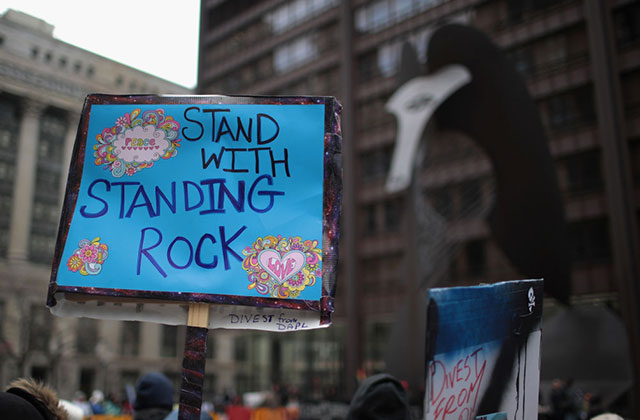Members of the Ramapough Lenape Nation live just 30 miles outside of New York City, near Mahwah, New Jersey. They’ve grown accustomed to gas stations and further development entering their community and covering tribal burial grounds.
Potentially next on the list is a pair of oil pipelines that would run from Albany, New York to Linden, New Jersey.
The New York Times explores the Ramapough’s battle against this pipeline system in a story published today (April 14). Pilgrim Pipeline Holdings proposed the two 178-mile-long pipelines in 2014, but it wasn’t until the protest movement grew at Standing Rock last fall that the tribe decided to set up its own camp: the Split Rock Sweetwater Prayer Camp.
The New York Times writes:
Their efforts intensified last fall. Inspired by protests of the Dakota Access Pipeline that drew thousands of indigenous people and their allies to the Standing Rock Indian Reservation in North Dakota last year, the tribe began holding demonstrations at Split Rock Sweetwater Prayer Camp, the main ceremonial grounds of its 14-acre territory. They have also erected several tepees that serve as a popular hub for prayer and organizing, and a small number of people have been staying in tents on the property.
The pipeline protest has united the Ramapoughs unlike any moment many elders can recall. Some lapsed Ramapoughs have even been inspired to connect with tribal life once again.
About six tribal members are currently occupying the camp. And while momentum at Split Rock has slowed down since President Donald Trump signed the presidential memorandum to complete the Dakota Access and Keystone XL pipelines, the Ramapough’s issue with the president pre-dates the pipeline.
When the tribe filed for federal designation in 1993, Trump launched a lawsuit claiming that the Indian Gaming Regulatory Act was unconstitutional for the "economic injury" it had imposed on his casinos in the past when different tribes opened casinos. Federal designation would allow the Ramapoughs to require New Jersey negotiate a "gaming compact" under the law, per a 1994 Securities Exchange Commission docket.
Trump then said on a radio show, “they don’t look like Indians” about the tribe. The tribeRamapoughs’ application was ultimately denied because of its proximity to Atlantic City, which kept them from accessing financial loans, healthcare access and allotted land.
“Trump ran a smear campaign, plain and simple,” said Chief Dwaine Perry to the Times. “And now we’re still dealing with the consequences of the racist lie he perpetuated.”
Those consequences include the obstacles the Ramapoughs face from local community members who have taken issue with their camp, but the tribe is continuing its resistance against the Pilgrim Pipeline. “As always,” said Perry, “it’s the Ramapoughs against the world.”
Read the complete story here.
